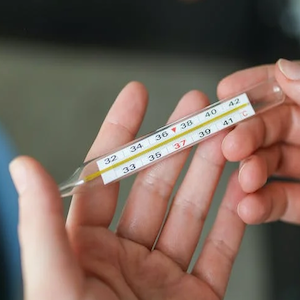 Smart Citations
Smart CitationsSee how this article has been cited at scite.ai
scite shows how a scientific paper has been cited by providing the context of the citation, a classification describing whether it supports, mentions, or contrasts the cited claim, and a label indicating in which section the citation was made.
Periodic fever, aphthous stomatitis, pharyngitis, and cervical adenitis recurrence temporally associated with allergen-specific immunotherapy in a female adolescent: a case report
Periodic fever, aphthous stomatitis, pharyngitis, and cervical adenitis (PFAPA) syndrome is the most common periodic fever syndrome in pediatric patients. It is clinically characterized by fever flares lasting 3-7 days, reappearing every 2-8 weeks with a distinctive clockwork regularity. PFAPA generally begins before 5 years of age and usually ceases 3-5 years after onset. Recurrences may be observed in adolescence and adulthood in up to 20% of cases. The authors aim to describe a case of PFAPA recurrence in adolescence temporally associated with allergen-specific immunotherapy (ASIT). A 16-year-old female patient was referred to the rheumatology unit due to recurrent episodes of fever one month after initiating ASIT for allergic rhinitis. These episodes occurred every 4 weeks and lasted 3 days. During these episodes, she also presented with a sore throat, tonsillar exudates, and cervical lymphadenopathy. Abortive treatment with oral prednisolone was attempted in these episodes, with complete resolution of fever after a single dose. After reviewing her medical background, she had previously experienced febrile episodes accompanied by aphthous ulcers and tonsillar exudates occurring every 7-8 weeks from age 2-7. The etiopathogenesis of PFAPA remains uncertain. Environmental triggers, particularly those with immunomodulator effects, may interfere with the immune responses responsible for PFAPA occurrence, but the mechanisms are still unclear. The authors describe the first report of the reappearance of PFAPA flares, possibly due to ASIT. Further studies are needed to fully clarify if ASIT constitutes a true environmental trigger of PFAPA.
Downloads
How to Cite

This work is licensed under a Creative Commons Attribution-NonCommercial 4.0 International License.
Authors who publish with this journal agree to the following terms:
- Authors retain copyright and grant the journal right of first publication with the work simultaneously licensed under a Creative Commons Attribution License that allows others to share the work with an acknowledgement of the work's authorship and initial publication in this journal.
- Authors are able to enter into separate, additional contractual arrangements for the non-exclusive distribution of the journal's published version of the work (e.g., post it to an institutional repository or publish it in a book), with an acknowledgement of its initial publication in this journal.
- Authors are permitted and encouraged to post their work online (e.g., in institutional repositories or on their website) prior to and during the submission process, as it can lead to productive exchanges, as well as earlier and greater citation of published work.

 https://doi.org/10.4081/reumatismo.2023.1594
https://doi.org/10.4081/reumatismo.2023.1594





